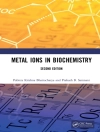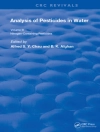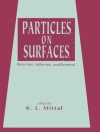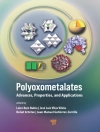Graphene Field-Effect Transistors
In-depth resource on making and using graphene field effect transistors for point-of-care diagnostic devices
Graphene Field-Effect Transistors focuses on the design, fabrication, characterization, and applications of graphene field effect transistors, summarizing the state-of-the-art in the field and putting forward new ideas regarding future research directions and potential applications. After a review of the unique electronic properties of graphene and the production of graphene and graphene oxide, the main part of the book is devoted to the fabrication of graphene field effect transistors and their sensing applications.
Graphene Field-Effect Transistors includes information on:
- Electronic properties of graphene, production of graphene oxide and reduced graphene oxide, and graphene functionalization
- Fundamentals and fabrication of graphene field effect transistors, and nanomaterial/graphene nanostructure-based field-effect transistors
- Graphene field-effect transistors integrated with microfluidic platforms and flexible graphene field-effect transistors
- Graphene field-effect transistors for diagnostics applications, and DNA biosensors and immunosensors based on graphene field-effect transistors
- Graphene field-effect transistors for targeting cancer molecules, brain activity recording, bacterial detection, and detection of smell and taste
Providing both fundamentals of the technology and an in-depth overview of using graphene field effect transistors for fabricating bioelectronic devices that can be applied for point-of-care diagnostics, Graphene Field-Effect Transistors is an essential reference for materials scientists, engineering scientists, laboratory medics, and biotechnologists.
Daftar Isi
Foreword xv
Preface xvii
1 2D Electronic Circuits for Sensing Applications 1
Diogo Baptista, Ivo Colmiais, Vitor Silva, Pedro Alpuim, and Paulo M. Mendes
1.1 Introduction 1
1.2 Graphene Inductors 3
1.2.1 Modeling of Graphene Inductors 4
1.3 Graphene Capacitors 5
1.3.1 Modeling Graphene Capacitors 8
1.4 2D Material Transistors 9
1.4.1 Most Common Topologies for Transistors 10
1.4.2 Modeling of 2D Materials-Based Transistors 11
1.5 2D Material Diodes 15
1.5.1 Most Common Topologies 16
1.5.2 Modeling of 2D Materials-Based Diodes 17
1.6 Graphene Devices 18
1.6.1 Graphene Frequency Multipliers 18
1.6.2 Graphene Mixers 18
1.6.3 Graphene Oscillators 19
1.6.3.1 Ring Oscillators 19
1.6.3.2 LC Tank Oscillators 19
1.7 Conclusion 19
References 20
2 Large Graphene Oxide for Sensing Applications 25
Jingfeng Huang, J. Amanda Ong, and I.Y. Alfred Tok
2.1 Graphene Oxide (GO) 25
2.2 GO as Biosensors 25
2.3 Large GO 26
2.4 Mechanism of Large GO via Modified Hummers Method 27
2.5 Large GO (Modified Hummers Method) Biosensors 28
2.6 Mechanism of Large GO via Reduced GO Growth 29
2.7 Large GO (Reduced GO Growth) Biosensors 34
2.8 Conclusion 38
2.9 Further Developments 38
References 39
3 Solution-Gated Reduced Graphene Oxide FETs: Device Fabrication and Biosensors Applications 43
Nirton C. S. Vieira, Bianca C. S. Ribeiro, Rodrigo V. Blasques, Bruno C. Janegitz, Fabrício A. dos Santos, and Valtencir Zucolotto
3.1 Introduction 43
3.2 Graphene, Graphene Oxide, and Reduced Graphene Oxide 45
3.2.1 Chemical Reduction 48
3.2.2 Thermal Reduction 49
3.2.3 Electrochemical Reduction 51
3.3 r GO-Based Solution-Gated FETs 52
3.3.1 Manufacturing Strategies 53
3.4 Applications of r GO SG-FETs as Biosensors 57
3.4.1 r GO Functionalization 59
3.4.2 Enzymatic Biosensors 60
3.4.3 Affinity Biosensors 61
3.4.4 Debye Length Screening and How to Overcome It 63
3.5 Final Remarks and Challenges 64
Acknowledgments 65
References 65
4 Graphene-Based Electronic Biosensors for Disease Diagnostics 71
Ahmar Hasnain and Alexey Tarasov
4.1 Introduction 71
4.1.1 A Promise for Diagnostics 71
4.1.2 Principle of Graphene FET Sensor 72
4.2 Device Fabrication Process 75
4.2.1 Graphene Synthesis 75
4.2.2 Graphene Transfer Over Substrates 76
4.2.3 Fabrication of GFET 77
4.2.4 New Developments 78
4.3 Functionalization and Passivation 78
4.3.1 Probe Molecules 79
4.3.2 Immobilization of Probe Molecules 80
4.3.3 Debye Length 81
4.3.4 Passivation 82
4.4 CVD GFETs for Diagnostics 83
4.4.1 Graphene-Based FET Biosensors for Nucleic Acids 83
4.4.2 Graphene-Based FET Biosensors for Antibody–Antigen Interactions 85
4.4.3 Graphene-Based FET Biosensors for Enzymatic Biosensors 87
4.4.4 Graphene-Based FET Biosensors for Sensing of Small Ions 90
4.5 Discussion 92
4.5.1 Summary 92
4.5.2 Challenges 92
4.5.3 Future Perspectives 93
References 93
5 Graphene Field-Effect Transistors: Advanced Bioelectronic Devices for Sensing Applications 103
Kyung Ho Kim, Hyun Seok Song, Oh Seok Kwon, and Tai Hyun Park
5.1 Introduction 103
5.1.1 Bioelectronic Nose Using Olfactory Receptor-Conjugated Graphene 106
5.1.2 Bioelectronics for Diagnosis Using Bioprobe-Modified Graphene 112
5.1.3 Biosensors for Environmental Component Monitoring Using Graphene 116
5.2 Conclusion 120
Acknowledgments 120
References 120
6 Thin-Film Transistors Based on Reduced Graphene Oxide for Biosensing 125
Kai Bao, Ye Chen, Qiyuan He, and Hua Zhang
6.1 Introduction 125
6.2 Working Principle of TFT-Based Biosensing 126
6.3 TFTs Based on r GO for Biosensing 128
6.3.1 Protein Detection 128
6.3.2 Metal-Ion Detection 131
6.3.3 Nucleic Acid Detection 134
6.3.4 Small Biomolecular Biosensor 135
6.3.5 Living-Cell Biosensor 137
6.3.6 Gas Detection 138
6.4 Conclusion 140
References 142
7 Towards Graphene-FET Health Sensors: Hardware and Implementation Considerations 149
Nicholas V. Apollo and Hualin Zhan
7.1 Introduction to Health Sensing 149
7.2 Graphene-FET in Liquid for Sensing 151
7.2.1 Graphene Transistors 153
7.2.2 Graphene Hall Structures in Liquid 156
7.2.3 Graphene Membrane Transistors 159
7.3 Device Implementation Considerations 160
7.3.1 Hardware and Instrumentation 160
7.3.2 Biostability and Biocompatibility 162
7.3.3 Medical Imaging Compatibility 163
References 164
8 Quadratic Fit Analysis of the Nonlinear Transconductance of Disordered Bilayer Graphene Field-Effect Biosensors Functionalized with Pyrene Derivatives 169
Sung Oh Woo, Sakurako Tani, and Yongki Choi
8.1 Introduction 169
8.2 Fabrication of Graphene-Based Field-Effect Biosensors 170
8.3 Fundamental Sensing Parameters of Graphene-Based Field-Effect Biosensors 173
8.4 Disordered Bilayer Graphene Field-Effect Biosensors Functionalized with Pyrene Derivatives 174
8.5 Quadratic Fit Analysis of the Nonlinear Transconductance of Disordered Bilayer Graphene Field-Effect Biosensors 177
8.6 Conclusion 181
Acknowledgment 181
References 182
9 Theoretical and Experimental Characterization of Molecular Self-Assembly on Graphene Films 185
Kishan Thodkar, Pierre Cazade, and Damien Thompson
9.1 Introduction 185
9.2 Experimental Tools to Characterize Molecular Functionalization of Graphene 186
9.2.1 Considering the Three Distinct Techniques Available for Functionalizing Graphene Are the Outcomes of the Three Functionalization Techniques Consistent, Similar, Reproducible Across all Three Techniques? 187
9.2.2 What Tools and Methods Are Available to Perform Such a Characterization of Molecular Self-Assembly Across the Nano to Macro Scale? 188
9.3 Atomistic Insights to Guide Molecular Functionalization of Graphene 196
References 203
10 The Holy Grail of Surface Chemistry of C VD Graphene: Effect on Sensing of c TNI as Model Analyte 207
Adrien Hugo, Teresa Rodrigues, Marie-Helen Polte, Yann R. Leroux, Rabah Boukherroub, Wolfgang Knoll, and Sabine Szunerits
10.1 Introduction 207
10.2 General Overview of C VD Graphene Production, Substrate Transfer and Characterization 210
10.3 Evaluation of Graphene Topographical Quality 212
10.4 CVD Graphene for FET-Based Sensing 214
10.4.1 Diazonium Chemistry on CVD Graphene 217
10.4.2 Pyrene Chemistry on CVD Graphene 220
10.5 Conclusion 225
References 226
11 Sensing Mechanisms in Graphene Field-Effect Transistors Operating in Liquid 231
Tilmann J. Neubert and Kannan Balasubramanian 231
11.1 Introduction 231
11.2 Field-Effect Operation in Liquid Compared to Operation in Air 232
11.3 Caveats When Operating FETs in Liquid 234
11.4 Graphene FETs in Liquid 235
11.5 Measurement Modes 236
11.6 Using FETs for Sensing in Liquid – Sensing Mechanisms 238
11.7 The Electrochemical Perspective 241
11.8 The GLI and p H Sensing 245
11.9 Detection of Nucleic Acids 246
11.10 Other Examples 247
11.11 Concluding Remarks 248
References 248
12 Surface Modification Strategies to Increase the Sensing Length in Electrolyte-Gated Graphene Field-Effect Transistors 251
Juliana Scotto, Wolfgang Knoll, Waldemar A. Marmisollé, and Omar Azzaroni
12.1 Introduction 251
12.2 Ion-Exclusion and Donnan Potential 253
12.3 Surface Modification with Polymer Films 255
12.4 Surface Modification with Lipid Layers 258
12.5 Surface Modification with Mesoporous Materials 260
12.6 Kinetic Cost of Extending the Sensing Length 262
12.7 Conclusions 265
References 266
13 Hybridized Graphene Field-Effect Transistors for Gas Sensing Applications 271
Radha Bhardwaj and Arnab Hazra 271
13.1 Introduction 271
13.2 Graphene 272
13.3 Graphene FET 272
13.4 Graphene in Gas Sensing 274
13.5 Graphene FET for Gas Sensing 275
13.6 Hybrid Graphene FET for Gas Sensing 277
13.7 Conclusion 281
Acknowledgments 281
References 281
14 Polyelectrolyte-Enzyme Assemblies Integrated into Graphene Field-Effect Transistors for Biosensing Applications 285
Esteban Piccinini, Gonzalo E. Fenoy, Wolfgang Knoll, Waldemar A. Marmisollé, and Omar Azzaroni
14.1 Introduction 285
14.2 Field-Effect Transistors Based on Reduced Graphene Oxide 286
14.3 Enzyme-Based GFET Sensors Fabricated via Layer-by-Layer Assembly 287
14.3.1 Layer-by-Layer (Lb L) Assemblies of Polyethylenimine and Urease onto Reduced Graphene-Oxide-Based Field-Effect Transistors (r GO FETs) for the Detection of Urea 288
14.3.2 Ultrasensitive Sensing Through Enzymatic Cascade Reactions on Graphene-Based FETs 292
14.4 Conclusions 296
References 297
15 Graphene Field-Effect Transistor Biosensor for Detection of Heart Failure-Related Biomarker in Whole Blood 301
Jiahao Li, Yongmin Lei, Zhi-Yong Zhang, and Guo-Jun Zhang
15.1 Introduction 301
15.2 Experimental Systems and Procedures 304
15.2.1 Fabrication of GFET Sensor 304
15.2.2 Decoration of Platinum Nanoparticles 304
15.2.3 Surface Functionalization 305
15.2.4 Immunodetection in Whole Blood 305
15.2.5 Electrical Measurements 305
15.3 Sensing Principle of GFET for BNP Detection 306
15.4 Device Characterization 306
15.5 Sensing Performance 308
15.5.1 Stability and Reproducibility 308
15.5.2 Selectivity 309
15.5.3 Sensitivity 309
15.6 Clinical Application Prospects 311
15.7 Advantages, Limitations, and Outlook of the FET-Based BNP Assay 311
References 313
16 Enzymatic Biosensors Based on the Electrochemical Functionalization of Graphene Field-Effect Transistors with Conducting Polymers 317
Gonzalo E. Fenoy, Esteban Piccinini, Wolfgang Knoll, Waldemar A. Marmisollé, and Omar Azzaroni
16.1 Introduction 317
16.2 Functionalization of Graphene Transistors with Poly(3-aminobenzylamine-co-aniline) Nanofilms 318
16.3 Construction of Acetylcholine Biosensors Based on GFET Devices Functionalized with Electropolymerized Poly(3-amino-benzylamineco-aniline) Nanofilms 322
16.4 Glucose Detection by Graphene Field-Effect Transistors Functionalized with Electropolymerized Poly(3-amino-benzylamine-co-aniline) Nanofilms 327
16.5 Conclusions 332
References 333
17 Graphene Field-Effect Transistors for Sensing Stress and Fatigue Biomarkers 339
Biddut K. Sarker, Cheri M. Hampton, and Lawrence F. Drummy
17.1 Introduction 339
17.2 Molecular Biomarkers 341
17.3 Graphene Field-Effect Transistor Based Biosensors 343
17.3.1 Graphene 343
17.3.2 Structure of Graphene Field-Effect Transistors 345
17.3.3 Sensing Mechanism of GFET Biosensors 346
17.4 GFET Biosensor Fabrication 348
17.4.1 Graphene Production 348
17.4.2 Device Fabrication 349
17.4.3 Graphene Functionalization 350
17.5 GFET-Based Stress and Fatigue Biosensors 353
17.6 Flexible, Wearable GFET Biosensors, and Biosensor Systems 358
17.7 Current Challenges and Future Perspective 362
17.7.1 Debye Length Screening 362
17.7.2 Device-to-Device Variability 366
17.7.3 Short Lifetime and Reusability Issue 366
17.8 Conclusion 367
References 367
18 Highly Sensitive Pathogen Detection by Graphene Field-Effect Transistor Biosensors Toward Point-of-Care-Testing 373
Shota Ushiba, Takao Ono, Yasushi Kanai, Naruto Miyakawa, Shinsuke Tani, Hiroshi Ueda, Masahiko Kimura, and Kazuhiko Matsumoto
18.1 Introduction 373
18.2 Toward Detection of Pathogens by Mimicking Cell Surfaces 374
18.2.1 Introduction 374
18.2.2 Fabrication of Sialoglycan-Functionalized GFETs 375
18.2.3 Evaluation of Sialoglycan-Functionalized GFETs 375
18.3 Signal Enhancement in GFETs 377
18.3.1 Sensitivity Enhancement by Increasing Receptor Density 377
18.3.1.1 Case of Linkers 377
18.3.1.2 Basis for Evaluation of Linker-Based Performance Enhancement 378
18.3.1.3 Evaluation of Performance Enhancement by Linkers 378
18.3.2 Ultrasensitive Detection of Small Antigens by Open-Sandwich Immunoassay on GFETs 380
18.3.2.1 Principle of Open-Sandwich (OS) Immunoassay 380
18.3.2.2 Advantages of OS-IAs with GFETs 380
18.3.2.3 Antibody Fragments and Device Fabrication 381
18.3.2.4 OS-IAs on GFETs 382
18.3.2.5 OS-IAs on GFETs in Human Serum 382
18.3.3 Real-Time Measurement of Enzyme Reaction in Microdroplets Using GFETs and Its Application to Pathogen Detection 384
18.3.3.1 Introduction 384
18.3.3.2 Measurement Mechanism and Model Measurement System 385
18.4 Practical Issues: Baseline Drift and Inspection Methods 387
18.4.1 Drift Suppression and Compensation of GFET Biosensors 388
18.4.1.1 Drift Suppression in GFETs by Cation Doping 388
18.4.1.2 Drift Compensation by State-Space Modeling 390
18.4.2 Deep-Learning-Based Optical Inspection of GFETs 393
18.5 Conclusion 398
References 398
19 High-Performance Detection of Extracellular Vesicles Using Graphene Field-Effect Transistor Biosensor 405
Ding Wu, Yi Yu, Zhi-Yong Zhang, and Guo-Jun Zhang
19.1 What is Extracellular Vesicles 405
19.2 The Clinical Significance of Extracellular Vesicles 406
19.3 Introduction to Graphene Field-Effect Transistor Biosensor 406
19.4 GFET Biosensor for High-Performance Detection of Extracellular Vesicles 407
19.4.1 Detection of the Overall Level of Microvesicles Using GFET Biosensor 408
19.4.2 Specific Detection of Hepatocellular Carcinoma-Derived Microvesicles Using Dual-Aptamer Modified GFET Biosensor 409
19.4.3 Label-Free Detection of Cancerous Exosomes Using GFET Biosensor 410
19.5 Some Prospects for Graphene Field-Effect Transistor Biosensor 411
References 412
Index 417
Tentang Penulis
Omar Azzaroni is an Adjunct Professor of Physical Chemistry at the Universidad Nacional de La Plata, Argentina. He is currently a fellow of the Argentinian National Scientific and Technical Research Council (CONICET) and head of the Soft Matter Laboratory at the Universidad Nacional de La Plata.
Wolfgang Knoll is an Honorary Professor at the Danube Private University in Krems, Austria. Previously, he was Scientific Managing Director of the Austrian Institute of Technology in Vienna, Austria, and before that one of the Directors at the MPI for Polymer Research in Mainz, Germany












